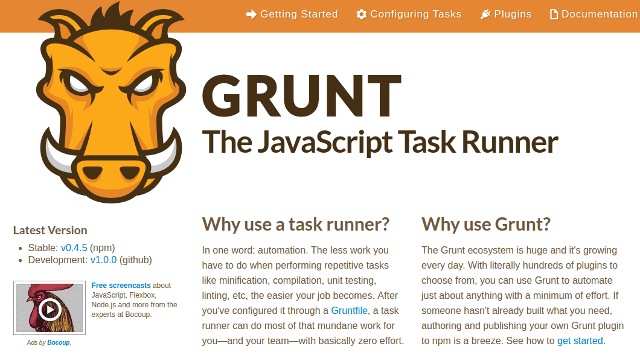In the world of build scripts, Gulp and Grunt have become quite popular, and each has its own share of proponents, critics, loyalists, and fans. Both Gulp and Grunt serve more or less a similar purpose: both can be used to automate certain tasks, as well as can be extended by means of plugins. Plus, they both rely on Node.js
That said, which one beats the other? Obviously, there can’t be a clear winner for this answer, but comparing one with the other, which script fares better and in what aspects? In this article, we attempt to answer this question.
Comparing Gulp And Grunt For WordPress Developers
Gulp.js
Rocking the tagline “automate and enhance your workflow,” Gulp has quickly gained popularity and has become the beloved of many developers around the world. Gulp is extremely easy to use, efficient, and can go a long way in saving both time and efforts for developers.
Gulp adheres to Node best practices, and as such, offers a minimal API allowing you to model it to suit your needs and your own workflow. As such, Gulp builds itself around your workflow.
Gulp has its own plugin repository, with more than 2,292 plugins.
Grunt.js
Grunt.js, the JavaScript task runner, has been around longer than Gulp and is therefore larger in terms of users and community strength — if one were to go by the numbers.
Much like Gulp, Grunt also focuses on automating basic tasks in development, thereby trying to save your time and efforts. Stuff such as minification and compilation can be outsourced to Grunt, and you can focus on bigger and better things.
Grunt is used by the likes of Twitter, Adobe, and jQuery, so relying on Grunt to be your task-runner will surely put you in good company. Grunt is also backed by plugins, and its repository currently has over 5,600 plugins that you can choose from.
Head To Head
Speed
Speed should be the biggest factor to consider when deciding between Grunt or Gulp. After all, both of these scripts intend to save you time by automating and running basic tasks, so speed comes above everything else, doesn’t it?
In simple words, Gulp has a speed advantage over Grunt.
You might ask, why? Well, this depends on how both scripts deal with automation. Grunt, for instance, uses intermediary files and disk I/O operations. Thus, your code is compiled and written to a temporary file on the disk, which is then built and auto-prefixed and then the destination file is written with the final code.
Gulp, on the other hand, uses Node streams and accomplishes all of that in-memory. So once your code is compiled, the result is sent straight to the auto-prefixer, without having to first write it to a temporary file on the disk. This saves a good deal of time, and while it might not matter much in smaller projects, when working with large chunks of code, Gulp surely does faster than Grunt.
To help you know more on this here is a slightly old but still relevant speed test.
Community And User Base
Grunt is older than Gulp, and therefore has a larger community and number of users. Plus, the number of plugins is also larger for Grunt, and Gulp has some catching up to do.
Of course, numbers do not mean much, and just because one script has more plugins does not really make it very well suited for every purpose. That said, at the end of the day, you have a higher chance of finding a plugin for Grunt than you do for Gulp, and similarly, you have a better chance of getting support from third-party resources and literature if you are using Grunt than you would for Gulp.
Note that, however, age is just a number, and as time passes, especially by the next year or so, Gulp will have risen to a greater size (assuming it continues to rise at its current pace).
Verdict
So, which one should you use?
In terms of speed of execution, one might be tempted to vote in favor of Gulp. However, you must also bear in mind the nature of your projects. For example, if you are working on a WordPress theme, the number of functions and files that you are dealing with are significantly small, and you will not find any noteworthy speed disadvantage should you opt for Grunt over Gulp.
The number of plugins, however, can be a small factor. If the plugin you want is available for Grunt but not for Gulp, you might have to rely on Grunt for the most part. Similarly, if you are fond of cleaner and leaner APIs, Gulp will serve you better. Plus, if configuring JSON objects does not interest you, Gulp again will be easier for you to get started with.
As such, it is wiser to make a decision based on your own needs, rather than sticking very rigidly to either one of the two and totally abandoning the other. And of course, there are capable developers who are not fond of Grunt or Gulp, and prefer using npm.
Which one do you prefer for your development workflow? Gulp or Grunt? Share your views in the comments below!



No Comments